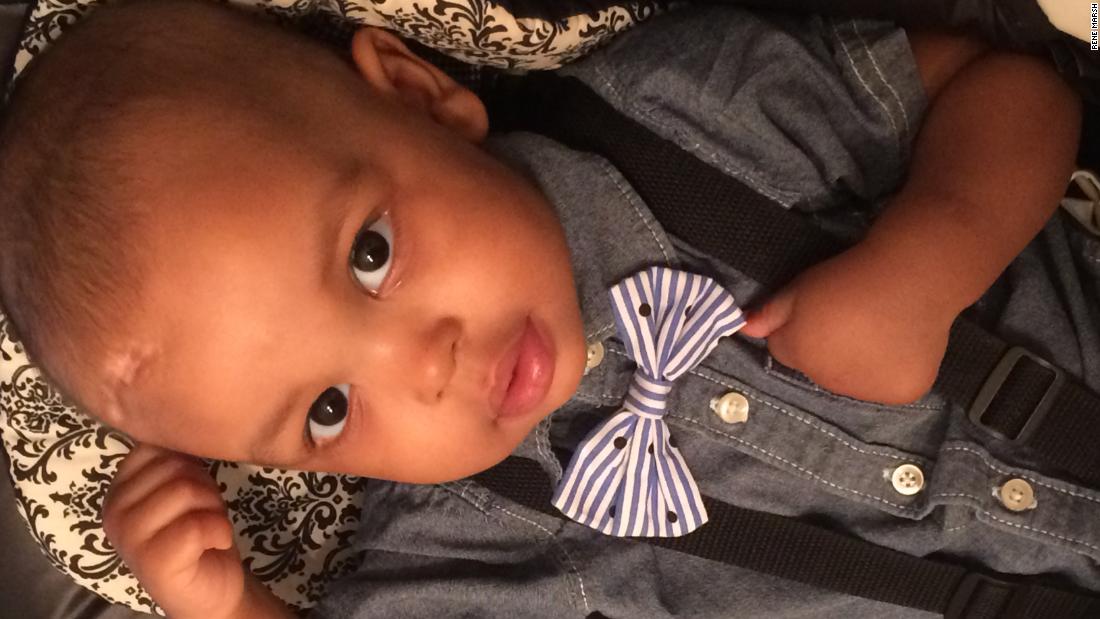Opinion: This Mother's Day, join the fight against pediatric cancer - 5 minutes read

René Marsh is a CNN national correspondent. The opinions expressed in this commentary are solely her own. View more opinion articles on CNN.
(CNN) This is my first Mother's Day without my 2-year-old son, Blake. It's been 25 days since he died in my arms after battling brain cancer for nearly a year and a half. I've received supportive messages from family, friends and strangers reminding me that I will always be Blake's mom. But every day — and especially today — I mourn the daily joys of being Blake's mom that pediatric brain cancer stole.
I mourn not being able to give Blake a bath, hold him or hear his angelic voice. What's worse is the fact that so many mothers across the country experience this agony; each year, about 2,000 children die from cancer in the US . Today, I'm sending out a call to action to every mother and every woman who yearns to be one: Let's use our power in the fight to save children from cancer.
Mothers have a long history of activism when it comes to fighting for voting rights ending segregation and preventing drunk driving . It's time for us to tackle pediatric cancer by addressing the insufficient research funding and lack of treatments developed specifically for children.
What many don't realize is that brain cancer is the deadliest form of pediatric cancer . Nearly 5,000 children in the US are diagnosed with brain tumors each year. Despite that fact, no drug has ever been developed and approved specifically for children with brain tumors.
Pediatric cancer is often more aggressive than adult cancer, and the two can differ in molecular makeup . However, children are often forced to rely on adult cancer drugs that have dangerous toxicities and side effects, including killing healthy cells in children's developing bodies. The pharmaceutical industry has not prioritized the research and development of cancer drugs for children, who represent a much smaller portion of the market compared to adults. When will corporate responsibility become en vogue for this industry that for decades has put profits ahead of doing what's right?
Children don't stand a chance in this profit-driven industry when you consider each year adult cancer drugs are some of the best-selling pharmaceuticals for companies like Merck & Co., Pfizer, AstraZeneca, Bristol-Myers Squibb, and Johnson & Johnson.
According to an Evaluate Pharma analysis in 2020, the industry made $145.4 billion on oncology drugs alone and is projected to rake in $311.2 billion by 2026, making up 21% of the pharmaceutical industry's total sales.
On their face, the statistics surrounding pediatric cancer look promising and suggest we ought to all breathe a sigh of relief. When you read , "Over the last 50 years, the survival rates for childhood cancer have risen from 10% to almost 80%," it's easy to miss the dire need that still exists for more funding for pediatric cancer research and development of more effective — and less harsh — cancer treatments for children.
Although it is true that technology and treatments have improved over the last 50 years, resulting in a better overall survival rate, the optimistic statistics surrounding pediatric cancer do not tell the whole story.
First of all, doctors and researchers use the term "survival rate" to refer to patients who have survived five years since diagnosis. This metric is from the 1930s when surviving cancer for more than five years was a nearly unattainable goal. Second, it includes not only children in remission but children still undergoing treatment and children dying from incurable cancers, according to Dr. Douglas Hawkins, a clinician at Seattle Children's Hospital and chair of the Children's Oncology Group . Finally, the metric ignores relapses after five years, deaths after five years and the burden of chronic health issues among the children who do survive.
According to a 2006 study that tracked the health of adults who were diagnosed with childhood cancer between 1970 and 1986, nearly 40% face severe or life-threatening complications 30 years after diagnosis, including kidney failure, heart failure, secondary cancers, loss of hearing or sight, and premature death. These complications in most cases are a result of the cancer treatments, according to Dr. Greg Armstrong of St. Jude Children's Hospital.
The consequence of the misleading metric of "survival rates" is that what is not properly measured is not effectively managed. In other words, Congress, government agencies like the National Institutes of Health, and other policy makers are using data that gives only a partial picture of the burden of cancer on children as they develop health policies and make research funding decisions.
Mothers can use our collective power to shift how the federal government and pharmaceutical companies prioritize children in the fight against cancer. That means using our platforms to raise awareness about the issue, letting our elected officials know we support and expect more funding for our children with cancer. Specifically, you can sign this petition and share it with others. The petition urges the Biden administration and Congress to have a comprehensive plan to end pediatric cancer as part of its national plan to eradicate the disease. This should include a plan to both partner with the pharmaceutical industry to incentivize more aggressive development of pediatric cancer drugs, and to urge Congress to increase government research funding.
In this movement to make pediatric cancer a national priority, we are protecting our children's futures and their ability to live out their dreams. We are protecting the experiences we hope to share with them as they grow up. A mother's love is powerful. A woman's love is powerful. Let us use that power to protect our nation's most precious resource.
Source: CNN
Powered by NewsAPI.org